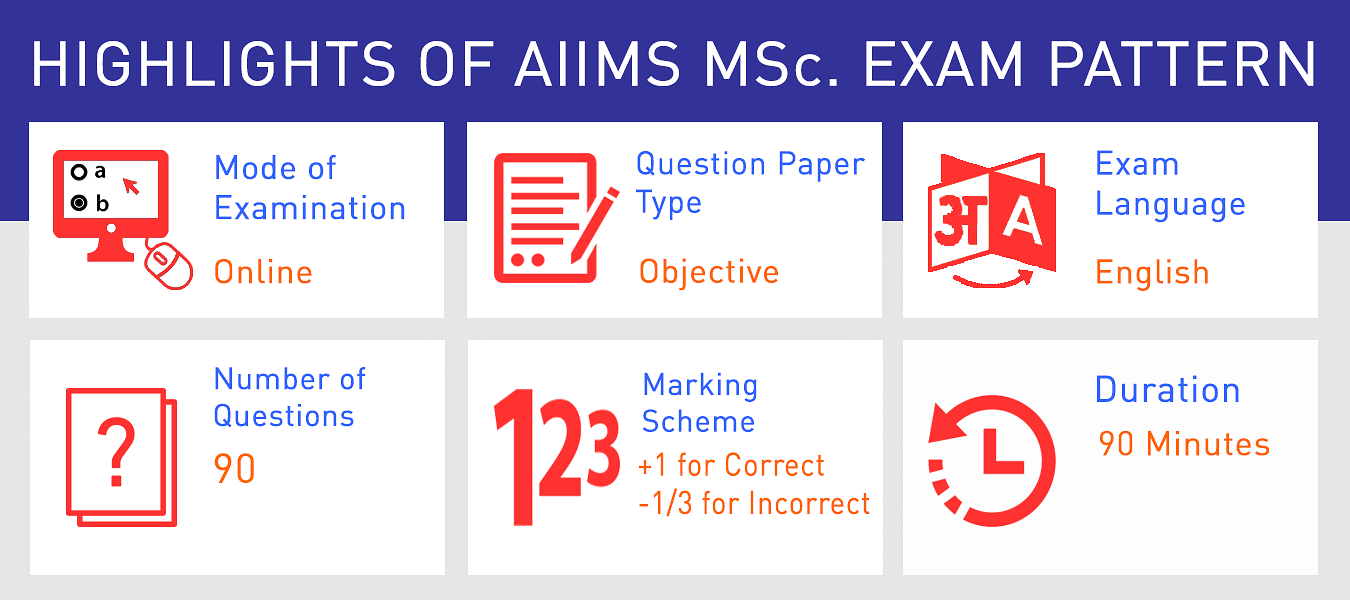AIIMS MSc 2025 exam will be conducted in online CBT mode. As per AIIMS MSc 2025 exam pattern, candidates will be asked 90 questions. There will be a +1 mark for the correct answer and a -1/3 deduction for incorrect answers. Question paper of AIIMS MSc 2025 exam will be set in a single language, i.e., English.
- The total time allotted for completing AIIMS MSc question paper is 90 minutes. There will be no specific sectional time limit, so you can start with whatever answer you are comfortable with. No marks will be allotted for the question unanswered or “MARKED FOR REVIEW” option. Now, let’s move on to discussing AIIMS MSc 2025 syllabus.
As of now, no specific syllabus has been prescribed for MSc Nursing and other MSc courses. However, for M. Biotechnology syllabus, topics include recombinant DNA technology, hybridoma technology, T cell cloning, etc. We have also updated for you with the related topics of AIIMS MSc 2025 syllabus. You can also get familiarized with exam pattern and syllabi with the mock test release at the official website after issuing the admit card.
Check: AIIMS MSc 2025 Exam Dates
AIIMS MSc 2025 Exam Pattern Highlights
Here is the image of the highlights of AIIMS MSc 2025 exam pattern:

AIIMS M.Sc 2025 Marking Scheme
The marking scheme of AIIMS M.Sc 2025 is given below:
- Candidates will be awarded +1 mark for every correct answer
- Applicants will face negative marking of -1/3 mark for each incorrect response
- There will be no marking for unanswered questions
- If more than one option is selected, it will be considered as incorrect answer
AIIMS M.Sc 2025 Syllabus
AIIMS M.Sc 2025 Syllabus is based on topics from graduation level. There are total 90 objective type questions in the exam. The syllabus is different for all courses as mentioned below. The tables represent complete syllabus of each subject. Candidates are required to check complete syllabus, before start preparation.
M.Sc. Nursing Syllabus
| Anatomy | English | Community and Health Nursing I | - |
| Physiology | Hindi and Regional Language | Communication and Educational Technology | Co-Curricular activities 3 |
| Nutrition | - | - | Midwifery and obstetrical nursing |
| Biochemistry | Co-Curricular activities 1 | Co-Curricular activities 2 | Community Health Nursing II |
| Nursing Foundation | Sociology | Medical Surgical Nursing III | Nursing Research and Statics |
| Psychology | Pharmacology | Child Health Nursing | Management of Nursing Services and Education |
| Microbiology | Pathology and Genetics | Mental Health Nursing | - |
| Introduction to Computers | Medical Surgical Nursing I | Midwifery and obstetrical nursing | Co-Curricular activities 4 |
| Midwifery and Obstetrical Nursing | Medical Surgical Nursing II | Mental Health Nursing | - |
| Community Health Nursing II | Child Health Nursing | Research Project | - |
M.Sc. Biotechnology Syllabus
| Recombinant DNA Technology | Hybridoma Technology | T Cell Cloning |
| Immunological Assays | Genetics Biophysical | Biochemical Dissertation Handling |
M.Sc. Syllabus
M.Sc. in Anatomy
| Gross anatomy with evaluation and comparative anatomy. Gross anatomy include functional anatomy. | Histological techniques, identification light and electronic microscopic structure of tissues of body. |
| Microscopic Anatomy, Development Anatomy and Genetics | Slides, specimens of developmental anatomy, genetics, neuroanatomy to assess comprehensive knowledge in these area. |
| Neuroanatomy including development and microscopic structure | Viva-voce on gross anatomy, living anatomy, sectional anatomy and neuroanatomy, development anatomy and genetics |
M.Sc. Biochemistry
| Structure and function of Biomolecules | Molecular Biology I | Molecular Biology II | Biostatics and Research documentation |
| Cell Biology and Physiology | Nutritional and Clinical Biochemistry | Basic Biotechnology | Bioinformatics |
| Enzymology | Plant Biochemistry | Immunology | Stem Cell and Reproduction |
| Bioenergetics and Intermediary Metabolism | Biophysical and Biochemical Techniques | Introductory Microbiology | - |
| - | - | - | - |
| - | - | - | - |
M.Sc. in Biophysics
| Elementary Crystallography | Methods of X - Ray Crystal Structure Determination | Numerical Methods | Theory and Practice of Direct Methods of Solving Structures |
| Principles of Macromolecular Structure & Function | Principles and Applications of Spectroscopy to Bio-molecules | Seminars in Biophysics | - |
| Mathematical Physics | Physical Studies of Macro - molecules in Solution | Basic Statistics | Membrane Biophysics & Neuro Biophysics |
| Computational Biology | Molecular Biology of Gene | Macromolecular Crystallography | Biophysics Laboratory |
| Object Oriented Languages | Algorithms and Data Bases in Bioinformatics | Crystallography Laboratory | - |
| Fundamentals of Molecular Spectroscopy (offered for other Departments only) | Basic Crystallography (offered for other Departments only) | Biophysics of the Immune System | - |
M.Sc. in Physiology
| Orientation to the department | Physiology | Submission of thesis |
| Choosing the subject of thesis and guide | Thesis work | Thesis work |
| Writing the protocol | Recapitulation of undergraduate physiology through attending UG lectures II | Physiology II |
| Recapitulation of undergraduate physiology through attending UG lectures I | Physiology I | - |







Comments